

CL: My guest is Mike Westerdal from CriticalBench.com and we’re talking about how to build a big bench part 2. If you missed part 1 you can read it here. I want to have a big bench this year. It’s the one lift that I’ve really neglected and it’s time for me to start paying attention to it.
Now, Mike, this is one that perplexes me: rep ranges. I mean, where should I be training if I want a big bench?
MW: Well, this is going to vary based on who’s asking. If you were asking, would you consider yourself an expert or an advanced lifter, or more moderate?
 CL: Well, I’ve been training seriously since 2000-2001, but I have not been training my bench press seriously, because it’s one of the lifts that I just… I have painful shoulders, first of all. I mean, my shoulders, whenever I start lifting or whenever I start using a straight bar to do bench presses, I get in this groove and for some reason my shoulders end up hurting. Maybe I’m executing the lift improperly.
CL: Well, I’ve been training seriously since 2000-2001, but I have not been training my bench press seriously, because it’s one of the lifts that I just… I have painful shoulders, first of all. I mean, my shoulders, whenever I start lifting or whenever I start using a straight bar to do bench presses, I get in this groove and for some reason my shoulders end up hurting. Maybe I’m executing the lift improperly.
MW: Yeah, it’s a very common issue. I had the same problem but when I changed my form by tucking my elbows in the pain went away.
CL: Right. Okay.
MW: But, as far as you having lifted for a good amount of time, if you haven’t done any low rep type training, before I would recommend something like that in your case. If you haven’t trained low reps before beginnng with 5 reps is a good starting point.
CL: Okay.
MW: What have you been training with typically? Eight to ten?
CL: No, I’ve been doing this new program right now. I’m using 140 dumbbells, but that allows me to kind of alternate my grip a little bit so I don’t have to get in that groove. And I do triples, but I do as many triples as I possibly can in 15-minutes. And usually I get about 12 sets of triples out. That’s what I’ve been working with recently.
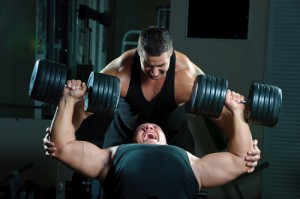 MW: I think that’s an awesome rep range, and I think that’s right on track. That is the rep range that I would recommend for people trying to get stronger, is heavy, heavy triples. Now, I don’t know what your goal was when you were training with that program. The only thing I’d say, you need to rest longer between sets so you’re fully maximized and ready for a full strength second set. But, maybe those were the heaviest dumbbell they have, so for you to get a good workout, maybe you just picked up the tempo a little bit.
MW: I think that’s an awesome rep range, and I think that’s right on track. That is the rep range that I would recommend for people trying to get stronger, is heavy, heavy triples. Now, I don’t know what your goal was when you were training with that program. The only thing I’d say, you need to rest longer between sets so you’re fully maximized and ready for a full strength second set. But, maybe those were the heaviest dumbbell they have, so for you to get a good workout, maybe you just picked up the tempo a little bit.
CL: Well, I’ve actually been experimenting with this routine where you do movements for 15 minutes and the idea is you progress when you can do more and more sets in that 15 minutes. But, this is not for strength.
MW: Density training?
CL: Yeah, exactly. It’s like a density training. Exactly.
MW: Okay.
CL: And it’s more for cardio. In my opinion, I’m getting a greater degree, a blending of cardiovascular, aerobic and anaerobic thresholds seem to blend about half way through the 15 minutes, because I’m pumping hard, I’m breathing heavy, you know what I mean? It’s almost like I’m doing cardiovascular.
MW: That’s a great workout. I’ve done those myself.
CL: Yeah. I like them.
MW: You should add up the number of reps you’re doing and the weight you’re moving.
CL: And then you times it by the number of weight and it tells you how much you’ve worked that day. Yeah.
MW: You’ve done a lot more work than you have with three sets of ten, if you add it all up. And in a shorter period of time.
CL: But, see, I want a big bench. I want to be able to lay down and put 340-350 on the bar and do a couple of reps with it, and I’m not going to get there with what I’m doing now.
MW: Yeah, I mean, obviously you’re going to have to start using the barbell and you’ll have to figure out what’s the matter with your shoulders. But, the rep range for strength, you want to be doing less than five reps.
CL: Okay.
MW: And the reason for this, as we touched on a little earlier, is because you’re training your neurological system. Your central nervous system has to adapt to these weights. And that’s the system that you’re training. So, it’s not so much the muscles, it’s getting your body used to this heavy stress, so with reps less than five.
My favorite happens to be triples. And then, as I get closer to an actual competition, you might go down to some doubles or singles for your sets.
CL: Right. Okay.
MW: That’s pretty agreed upon that lower reps are going to build strength and then higher reps build hypertrophy. And then you have even higher reps that work more muscle endurance and cardio.
 CL: Yeah. And you know, it’s really interesting because we come back to, the key component of strength is the nervous system, it appears. And I don’t think enough is done…there’s enough attention paid to things that help the nervous system recouperate and actually strengthen the nervous system.
CL: Yeah. And you know, it’s really interesting because we come back to, the key component of strength is the nervous system, it appears. And I don’t think enough is done…there’s enough attention paid to things that help the nervous system recouperate and actually strengthen the nervous system.
One of the things that I used to experience when I was squatting heavy and deadlifting heavy, was what I started to call noise in my head. It was like I would get under the bar to squat and my adrenaline would come up and I’d have like 1,000 things racing through my mind, like, unrack the bar, walk back properly, keep my back straight, gee, I’m nervous. What if I get too far down in the hole and I can’t come out? It’s like all these things like they just hit you all at once. And I used to call it noise. And I learned that if you can get rid of a lot of that noise in your head, you’re stronger.
So, the things that you’re saying here about the nervous system that eliciting strength, the three rep range because we’re really training to kind of elicit a response from the nervous system. I think a lot of it really does come down to the brain, the spine and the nerves as they run through the body.
MW: Yeah, definitely.
CL: it’s amazing.
MW: Just comparing a powerlifter to a bodybuilder, you take two full-grown men and you have one guy that’s absolutely huge and another guy that doesn’t look that big. The smaller guy that’s the powerlifter is actually stronger, and it’s the way he trains. The bodybuilder trains to look big, whereas the powerlifter trains to actually be strong.
CL: Right.
MW: And if you want the best of both worlds, you do what we talked about earlier, you train your heavy exercises with heavy triples and then you move on to your isolation assistance stuff and do some higher reps to make the muscles bigger.
CL: Right. I remember one day I was actually judging an event here in Louisville and I can’t think of the guy’s name. He came from Indianapolis, a black guy, powerlifter, a really, really nice, very, very low key guy. And he was about 178…yeah, I think he was 178 pounds and he pulled 700-pounds in the deadlift that day. And I happened to be sitting on the side and I was a side-judge, and I remember watching. He didn’t have a shirt on and I remember watching as he lifted the bar, the muscles in his back… It was almost like when you watch those war movies where they drop a bomb and you see the shockwave go out into the dessert. You know what I’m talking about?
MW: Yeah.
CL: It was like the shockwave went up from his lower back, up into his lats and his… I mean, it was like a flashbulb, boof. It was just the most beautiful thing I’ve ever seen. If I could have caught it like in one of those high-speed cameras where you could play it back… You could see muscle fibers becoming recruited in groups in his back. It was just… I was like, man! And that’s muscular efficiency. This guy is reaching a lot more muscle fibers in his body than most people are, and that’s why at his weight he was able to pull that weight. It’s really an amazing thing.
The nervous system is really overlooked when it comes to strength. I mean, people need to pay more attention to it, really, in my humble opinion.
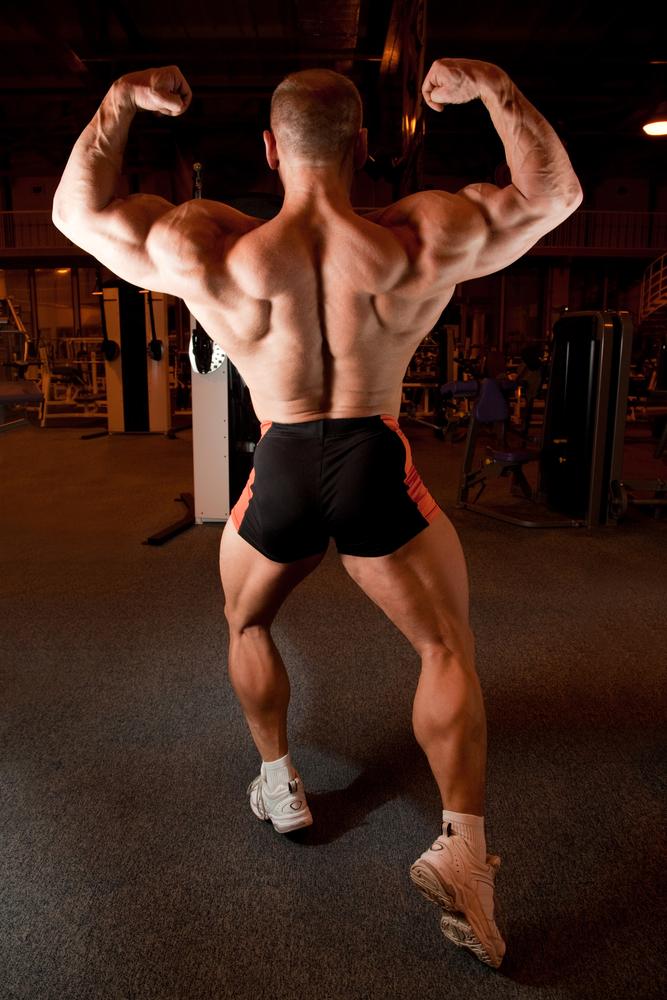 MW: Yeah, I mean, you can’t really stereotype a bodybuilder versus a powerlifter, because they often train a lot of the same exercises and do different routines and obviously there’s some extremely strong bodybuilders, I’m just comparing the top bodybuilders to the top powerlifters.
MW: Yeah, I mean, you can’t really stereotype a bodybuilder versus a powerlifter, because they often train a lot of the same exercises and do different routines and obviously there’s some extremely strong bodybuilders, I’m just comparing the top bodybuilders to the top powerlifters.
CL: You know, Ronnie Coleman is an example of an extremely strong bodybuilder. I think Ronnie Coleman could have…
MW: He’s got a powerlifting background.
CL: Right. I was just going to say that. He came from powerlifting and he’s kept a lot of that mentality as he’s build his body. I always wondered if he would go back into powerlifting someday, actually.
MW: Yeah, you’ve got Johnnie Jackson as well.
CL: Yeah.
MW: He’s in the magazines now, saying he’s the strongest bodybuilder.
CL: Yeah. I don’t buy that. I think Ronnie is stronger than him. Maybe pound-for-pound, maybe if you looked at his weight class versus Ronnie’s weight class, Johnnie Jackson is stronger. But, I don’t know how he can claim that he’s the strongest bodybuilder in the world, because…. I mean, for crying out loud, I mean… Ronnie Coleman was front squatting…what was he front squatting back in those videos, 600-pounds and stuff?
MW: Yup.
CL: I mean, it’s like…
MW: Something ridiculous.
CL: I mean, come on.
MW: Those were crazy videos.
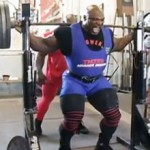 CL: I mean, I feel pretty confident that Coleman could probably easily deadlift 1,000-pounds.
CL: I mean, I feel pretty confident that Coleman could probably easily deadlift 1,000-pounds.
MW: I wouldn’t put it past him.
CL: And that’s probably…that’s a pretty top lift in this day and age, right? I mean, for the…
MW: Without wearing a deadlift suit, no one’s ever done it that I know of.
CL: Really? He did…what did he do in that one training video he did? I want to say he deadlifted 800-pounds for two reps and all he was wearing was a belt.
MW: Wow.
CL: So, I mean, I’ve got to believe he could pull 1,000-pounds.
But, anyway, okay. So, let’s get back to the subject at hand. Another mistake that people make that you’d like people to focus on is neglecting their back muscles. Now, this is counter intuitive. Why would I want to worry about my back muscles if I’m doing a bench press?
MW: Right. And you don’t see it in the mirror, too. So, you don’t train it as hard. But, that’s more of a joke. Most people definitely are training their back, but…
CL: No, I know.
MW: As for me, I really like bench pressing, so I definitely worked really hard on the bench press where when back day rolls around, I might cut a few sets off or cut the workout short and over time, that stuff adds up and will affect your bench press? Well, we talked about that a little bit earlier, too. You do use your lats to stabilize the weight on the way down, in the bench. It creates a shelf for you as well, as you’re lowering the weight. So, actually half the lift controlling the weight on the way down, you need to have a strong back.
CL: So, would you train… Now, there’s some common opinions out there about training the back in the same plane as you do the bench press. So, you would do like rowing movements in that same…
MW: Like lat pull downs, pull ups, rows, and exercises like that.
CL: Right, because that’s kind of the opposite direction of the bench press. So, you would agree with that?
MW: Yeah, definitely.
CL: Okay.
MW: Lat pull downs and rows would be great exercises to do. And if you could even copy your bench press form, that same way you bench, and then grab the lat pull down bar with the same width, the same grip, and keep your elbows in the same direction and just do the exact opposite of a bench press, lean back a little bit.
CL: Now, here’s one that’s not on your list, but I’m just curious what your opinion is. What role do you think the brachialis and the forearms play in a raw bench press? Do you think they play any role at all?
MW: They stabilizes too, on the way down. So, hammer curls are a great bicep exercise for anybody trying to get a bigger bench.
 CL: I was just going to say that, because I’ve always…when I’ve looked at bench presses when I was judging and spotting, I would look and I would always think to myself that when you see the load…when they unrack the bar and the load hits them, you can see their brachial muscles really straining as they’re bringing the bar down.
CL: I was just going to say that, because I’ve always…when I’ve looked at bench presses when I was judging and spotting, I would look and I would always think to myself that when you see the load…when they unrack the bar and the load hits them, you can see their brachial muscles really straining as they’re bringing the bar down.
MW: Exactly.
CL: That would be an important group, as well, not to overlook. So, but again, the key here is to build a big bench, you have to think about the other compensating muscles, if you will, that are also aiding in the lift. It’s not just shoulders and chest and triceps.
MW: Right, you’ve got to find out what you’re weakness is. If you’ve got stabilization problems and shaking all over the place, you might have to put a little time in with a little bit higher reps before you can get to the lower reps. And if you have problems bringing the bar down under control, that could be your stabilizers in your back. If you have problems locking it out, you know you’ve got problems with your triceps. If you get stuck right on your chest, you need to work the actual chest muscles a little more. You’ve got to break the lift down into all different segments and figure out exactly what your weakness is and then address that.
CL: Now, the last one that you have here is too much cardio. This is a perplexing one because I know that a lot of powerlifters are guilty for almost using the sport that they choose to just become…Italians, we call them gavones, you know, just like swallow everything that’s relatively close to them and say, well, I got to because between tissue leverage and I got to keep my weight up, and all these other excuses.
MW: Yeah, exactly. It’s excuses.
CL: But then, there’s the other side, there’s the guys who want to look like Mariusz Pudzianowski and be like ripped to shreds and be really strong. So, where does cardio even fit in?
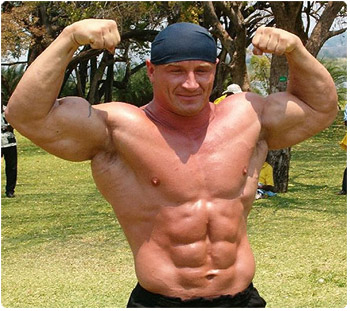 MW: I mean, you’ve got to find a balance and it’s going to be different for everybody based on your metabolism and how your body responds and what your nutrition is like. But, the only constant thing we have is the training. I don’t know how much sleep you’re getting. I don’t know how you eat. So, you just can’t be doing a lot of heavy cardio right before you’re about to go weight train. Obviously, that’s a no-brainer.
MW: I mean, you’ve got to find a balance and it’s going to be different for everybody based on your metabolism and how your body responds and what your nutrition is like. But, the only constant thing we have is the training. I don’t know how much sleep you’re getting. I don’t know how you eat. So, you just can’t be doing a lot of heavy cardio right before you’re about to go weight train. Obviously, that’s a no-brainer.
I mean, you see people actually running on the treadmill and stuff before they work out. I mean, that’s day one. That should be common sense not to do that.
CL: But, I do ten minutes of warm-up cardio. I don’t do anything insane.
MW: That’s different. That’s warm-up.
CL: I mean, I do ten minutes and it’s nothing arduous. I mean, I just do ten minutes to bring my body temperature up a little bit.
MW: Yeah, that’s good. You’re just warming-up.
CL: Okay. You’re not opposed to that, but you’re saying like putting in a 45-minute, like elliptical at a full tilt pace and then expecting to go and lift weights.
MW: Yeah, forget about it.
CL: Okay. So, where does cardio fit in?
MW: Well, you do need some cardio. You want to work your heart, obviously, and keep your body fat levels down. What kind of cardio you want to do, you just have to limit this to how your body responds. I’m talking maybe three days a week might be good, for someone else, four days a week might be good. But, then you’ve got other people, they email me, they’re following my bench press program and they tell me that they run five miles every morning. They do this like six days a week and then they’re wondering why their bench press isn’t going up. I’m like, you’re lucky your bench press is even staying the same it should be going down!
If you want to get your cardio in, it doesn’t always have to be like fat burning heart rate where you’re going for an hour. Try doing some sprints or some high-intensity cardio once or twice a week and then you could throw in like a lot of bodybuilders do, 45-minutes of walking on the treadmill on an incline.
CL: Yeah. I’m a big fan of walking, especially… I’ve found that if you want to lose weight, the best thing that you can do is walk first thing in the morning, before your first meal, and you don’t have to do anything insane. I’m talking about 20 minutes. I tell people, walk out the door, walk ten minutes in one direction, walk ten minutes home, and go have your first meal.
MW: Yeah, you’re doing it on an empty stomach, you’re burning fat, and you’re waking up.
CL: You’ve fasted…you’re eight hours fasted, you’ve been sleeping, so you’re fasted. Your body is already shifted into using fat as its primary substraight for energy at that moment in time.
Now, Mike, I mean, in your opinion, is the bench press the most important lift that people can… I mean, there’s a lot of theories out there that the deadlift and the squat and…where does the bench press fit in, aside from the fact that it’s one of the three lifts that you have to perform as a powerlifter?
MW: Well, I’m biased, obviously, as founder of CriticalBench.com, and it’s my favorite lift. But, I’m going to have to say it’s one of the top three, right there with the squat and the deadlift. Because, most people don’t realize it is a full-body exercise.
I mean, if you do it right, you can even get sore in your quads, your tris, your back, your shoulders, your forearms can even get sore, your grip. I mean, if you put everything into this and do it the right way, it can be a full-body exercise. So, I’m going to put it in the top three. My favorite exercise though.
CL: Can I ask what your bench is today?
MW:

CL: Impressive! I’m going to just summarize, okay, so we can wrap this up and pick it up where we’re leaving-off in the next episode.
If you want to build a big bench press, first you have to stop making the mistakes that could be hindering your progress. And as Mike has laid-out today, the top seven mistakes, the first thing is over-training. You should be only training your bench press perhaps once, maybe maximum twice a week. Correct?
MW: Right.
CL: Okay. Don’t do silly things that pre-fatigue muscles. This isn’t about bodybuilding, this is about strength building. So, don’t do too many warm-up sets and also, pay attention to your workout splits. Don’t work a muscle group that’s going to be critical for you to lift, to perform that bench press that day.
The third thing is self-doubt. No negative talk, lay down on the bench, do the best you can, don’t give yourself an out, don’t give yourself a backdoor. Don’t start setting it up for you not to attain your goal. Which leads to number four, which is make sure you’re setting goals. Write down. If you’re starting at 225, then your first plateau goal should be maybe adding 25-pounds to your bench press. When you get there, then you can go from there. But, you have to have goals. If you’re not setting goals and you’re just… It’s like leaving on a trip across country and not knowing what state you’re going to end up in, and not having a map. But, you just know that you’re going to go across country. I mean, that might have been a worthy goal back in the ‘60s when the hippies were around, but for the bench press, it’s not a good one.
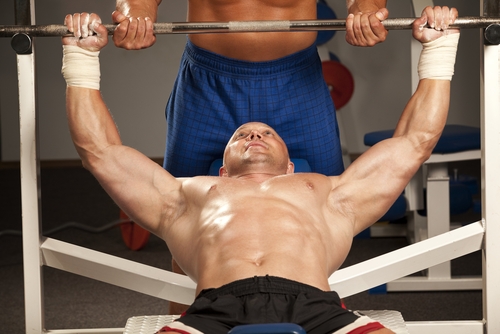
And then, obviously, the rep ranges. Mike likes the five or under, preferably he likes doing triples. I tend to believe that that’s a good rep range, too, because you’re managing fatigue then. Would you agree with that statement, you’re managing fatigue when you’re doing lower rep ranges?
MW: Yeah, and you’ve got to take some time between sets, at least three minutes, maybe five minutes between sets. We didn’t mention that.
CL: Well, let’s talk about that for a second. That’s a very important point. I stand to feel that you should rest in between sets as long as you need to, until you psychologically feel like you want to get under the bar again. That’s what I like to do in between sets when I’m trying to lift heavy, personally.
 MW: Yeah, I mean, first make sure your breathing is completely back to normal, and then make sure you’re mentally ready, like you said.
MW: Yeah, I mean, first make sure your breathing is completely back to normal, and then make sure you’re mentally ready, like you said.
CL: Right, right. Okay. Then, the sixth thing on the list is don’t neglect other muscles, like the back muscles, and even the brachials and hammer curls for the brachials and rowing movements for the back muscles, because they play a large role in your bench press. You’re never going to get a strong bench press if your back muscles are not up to the job. Would you agree with that statement?
MW: Definitely.
CL: Okay. And then lastly, too much cardio. A little bit of warm-up cardio is a good thing, but doing 45-minutes on the treadmill and then expecting to go into the pit and start lifting heavy, you’ve pretty much taxed your body already. You’ve used up a lot of energy stores and now you’re expecting to go and lift heavy, and you just can’t do it. Can’t do it.
All right, so Mike, I’m going to have you back on the show soon to talk about your new book coming out next week called Bench Press Explosion. Give us the scoop on that real quick.
MW: Sure I can’t wait for the follow up interview. As for Bench Press Explosion I’ve put together a book that outlines not just how to perform the bench press with perfect form but it also contains 18 different of Bench Press Routines. I call this the BOB program, because it’s the “Best of Bench”. Everyone has different family obligations, work schedules and equipment so this book should have several routines that everyone can benefit from. I’ve collected these routines from some of the biggest baddest beasts on the planet that I’ve had the privilege of meeting, interviewing or train with. I plan on releasing this next week so stay tuned.
CL: I’m sure this will be amazing. Otherwise, the website wouldn’t be called Critical Bench, it would be called MediocreBench.com.
MW: Right on…lol
CL: Okay. Visit Mike’s website, CriticalBench.com, check it out. He’s got lots of great information there, more than just bench pressing. I mean, if you’re a strength athlete, whether you’re a football player or you’re an MMA fighter, and you depend on strength, you can always find great information about building raw strength at CriticalBench.com.
All right, well, anyway. Listen, I want to thank you very much for taking the time to come on the show today and talk about how to build a big bench. This is really an issue of mine as well this year. I do want to have a respectable bench, once and for all. You know what? I’m always proud to go to the gym on back day and leg day, because I can move heavy weight with the best of them. And then, I’m always timid to go in on chest day because I’m throwing around 140-pound dumbbells and I’m like, man, I really want to get under the bar and put a few plates on and go at it, and I just can’t. Well, there you go. I’m negative talking, Mike. See, if you were here, you could smack me.
MW: Some people say that helps them lift more, but that doesn’t work for me, it just makes me want to smack them back…just follow these tips we’ve been talking about Carl and you’ll be well on your way to 300 lbs and beyond!
CL: All right, good. Listen, Mike, thanks for being on the show. We’ll talk to you real soon.
Important Links:
Part 1: How To Bench Press 300 LBS & Beyond! (interview)
Thanks for the helpful tips. I just have one question that wasn’t included in this interview. How far down should I bring the bar when benching on a flat bench? Some places I’ve read say to stop when the back of your arms are parallel to the floor. Other places say to touch the chest. Which is it? I’m currently using the parallel method to avoid hurting my shoulders while lifting 315 @ 3 reps. Am I cheating?
Great interview, Carl – thanks for posting the transcript! Between what yu have here and a couple of Mike’s training videos I’ve seen online, there’s no doubt his new book will be awesome – can’t wait to recommend it to our readers…
Amazing material !!! I really enjoyed the read all is a lot more clear for me now before i wasn’t sure about differences between hypertrophy and strength for the uninitiated looks the same the regular thinking of people in the gym is just add weight and you will make muscle gains and get really strong and somehow is kind of true but there is a big difference as you have explained all is in the way you train and what your goal is(hypertrophy or strength or a bit of both), great
there is just one question I got now how do you know what`s the right weight to do your triplets, is it your max at 3 reps i mean the weight that you can only lift 3 times ? and how many sets should you do with triplets? and finally when should you move on and add more weight ? well more than one question lol
thanks a lot this was really helpful !!!!!!!
First of all, thank you for the tips shared. I’m sure there is much more to find out from the newly released book.
There are some queries that would like to address in regards with the cardio suggestion. By other authors in the field, sprints are also CNS consuming. Would they affect performance if do the sprints between the power training days (let’s say day before or after the bench press days with low reps)? Or better to place them right after power training sessions?
Just for variation, jumping rope is an alternative for cardio. Question about this exercise: is it CNS consuming (if let’s say do it for about 15 minutes with short brakes)? What is the optimum solution: do it during the days off from prower training, or is better to place it in the same day right after the power training sessions?
Thank you for advice.
Well, I’m ready to get started!! As I said in my previous post, receiving a copy of the program and getting started is more for my wife than myself. Even though I will benefit greatly, the need for me to become stronger and physically fit would allow me to better care for my wife. I might add, I have a deep appreciation and respect for the folks in the healthcare/caregiver field. Being a caregiver takes a toll on you physically and mentally. The way I see it, I need to be there for my wife. Getting in shape and stronger is the key.
Thanks!!
Arm strength and hand grip techniques are an important in the sports I compete in Wrestling, Football. I am interested in better workouts to improve on my strength and grips for more explosive matches on and off the field and mat. I would also like to see better techniques for leg conditioning
Thank You
Tyler
So here’s the Deal. I weigh 140 pounds and my bench fluctuates from 300-315…As of yesterday I was guilty of doing the pre-fatigue workout. Doing my 10’s and 8’s before hitting the big stuff thinking this would build strength the best…Now I find out I was incorrect. I have already learned something from just the free e-books and that is exciting to me. I am so excited to see what else you can teach me to reach my goal of 405…I know this is a big Goal, But I have already silenced a lot of people with my bench press and I know I am capable of doing it…I visualize it all the time and I can see myself doing it. I just need some more tools in my arsenal to move forward. Thank you so much for all the helpful Tips about rep ranges and what is best for strength. I have switched my workout to 5 x 5 for now and then I will move to triples, And I’m saving all the 10’s and 8’s for Later. Thank You
I enjoyed the tips and agree not doing cardio before lifting weights. I am kind of hesitant about lifting heavier because not being able to get it up. Anyway enjoyed the tips and will have to try those in my workout.
What are triples? Could you give me an example of what that would look like on my bench? Right now, I’m doing 275×5. Thanks
Triple are when you do 3 repetitions.
I also was having some discomfort in my left shoulder while bench pressing. After watching a video on this site that explained the concept of bringing the elbows in before lowering the bar for the first rep, and applying it while training, my pain has been much less and continues to get better over time.
Thanks for sharing both parts of this interview – it was cool to hear your take on building a bigger bench – especially as it relates to rep ranges, training frequency and cardio.